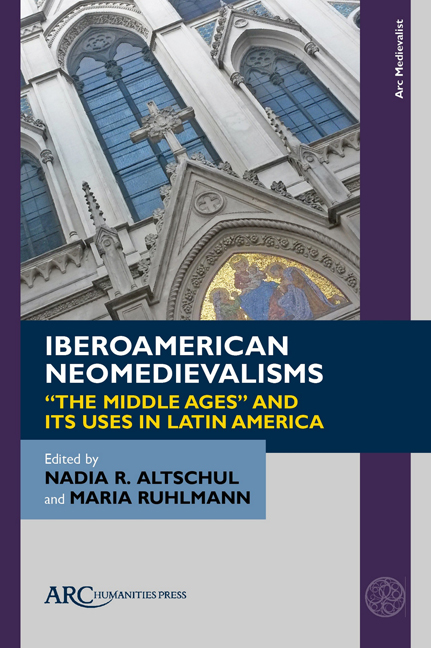Book contents
- Frontmatter
- Contents
- List of Illustrations
- Chapter 1 Postcolonizing Neomedievalism:An Introduction
- Chapter 2 The Criollo Invention of the Middle Ages
- Chapter 3 A Militant and Peasant-Based Medieval History in Brazil: Fanning the Spark of Hope
- Chapter 4 Neomedievalism and the Hagiography of Valdemiro Santiago: Neopentecostal Sanctification
- Chapter 5 The “Middle Ages” in the Brazilian Presidential Elections of 2018: The Left, the Right, and the Centre
- Chapter 6 Averroes in Mid-Colonial and Inter-Imperial Cordoba
- Chapter 7 Hypermedievalizing and De-Medievalizing Dante: Leopoldo Lugones’s and Jorge Luis Borges’s Rewritings of Inferno V
- Chapter 8 Borges and Kennings
- Chapter 9 Memory, Desire, and Sexual Identity in Manuel Mujica Lainez’s El unicornio
- Chapter 10 Rewriting and Visualizing the Cid: The Reconstruction of Medieval Gender and Race in Argentinian Graphic Novels
Chapter 6 - Averroes in Mid-Colonial and Inter-Imperial Cordoba
Published online by Cambridge University Press: 18 November 2023
- Frontmatter
- Contents
- List of Illustrations
- Chapter 1 Postcolonizing Neomedievalism:An Introduction
- Chapter 2 The Criollo Invention of the Middle Ages
- Chapter 3 A Militant and Peasant-Based Medieval History in Brazil: Fanning the Spark of Hope
- Chapter 4 Neomedievalism and the Hagiography of Valdemiro Santiago: Neopentecostal Sanctification
- Chapter 5 The “Middle Ages” in the Brazilian Presidential Elections of 2018: The Left, the Right, and the Centre
- Chapter 6 Averroes in Mid-Colonial and Inter-Imperial Cordoba
- Chapter 7 Hypermedievalizing and De-Medievalizing Dante: Leopoldo Lugones’s and Jorge Luis Borges’s Rewritings of Inferno V
- Chapter 8 Borges and Kennings
- Chapter 9 Memory, Desire, and Sexual Identity in Manuel Mujica Lainez’s El unicornio
- Chapter 10 Rewriting and Visualizing the Cid: The Reconstruction of Medieval Gender and Race in Argentinian Graphic Novels
Summary
Twentieth-century scholarship on the Iberian Middle Ages commonly includes references to Latin America, and these references are frequently found in the writings of Spanish scholars. The two most cited Spanish medievalists of the twentieth century are Américo Castro (1885–1972) and Claudio Sánchez-Albornoz (1893–1984). Both explicitly acknowledged that they thought of their projects as being highly relevant for Latin America. This region did not exist in the minds of medieval Iberians, and its place in studies of this era is a product of the controversial positioning of Latin America as a peripheral extension of Spain. Once independence severed the political knot tying Spain with Latin America, some scholars, hispanistas, emphasized and strengthened other forms of bonds that, in their minds, still linked Iberia and Latin America. The central claim of this mentality, hispanismo, is that a common spirit inspires every single nation whose first language is Castilian Spanish. Hispanismo situates Madrid, the metropole, in a privileged position to draw the contours and characteristics of the purportedly great Hispanic spirit. The most visible vector uniting Spain with its former colonies is the Castilian language, which thus becomes the most potent manifestation of an assumed shared legacy and soul. Because of the centrality of the Castilian language to the hispanista project, the Middle Ages, the era in which this common language is born, comes to the fore as a Romanticized origin myth for Spain and, more broadly, for the Hispanic spirit that supposedly continued to thrive in Latin America.
When hispanistas write about the Middle Ages, they cast Spain in the role of primus inter pares among the nations of the Spanish-speaking world. Naturally, anti-hispanistas counter this ideology in their writings about the Middle Ages. One such anti-hispanista was Argentine writer Jorge Luis Borges (1899–1986). This article will explore how his 1939 story “La busca de Averroes” (Averroes's Search) challenges hispanismo. Although set in twelfth-century al-Andalus, the story alludes to the incipient version of Spanish spoken in the streets of Iberia. The first paragraph notably mentions that “Averroes” feels “Spain.” The mention of Spain and of the Spanish language in a story written in Spanish is far from incidental—an aspect of the tale that has not received the scholarly attention it deserves.
This area of study has not been explored in-depth, largely because Latin American approaches to the Iberian Middle Ages themselves have been overlooked.
- Type
- Chapter
- Information
- Iberoamerican NeomedievalismsThe Middle Ages' and Its Uses in Latin America, pp. 101 - 120Publisher: Amsterdam University PressPrint publication year: 2023



